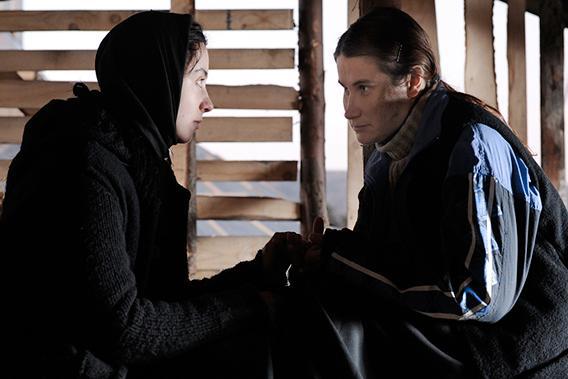Beyond the Hills is the Romanian director Cristian Mungiu’s follow-up to his magnificent 4 Months, 3 Weeks, and 2 Days, which won the Palme d’Or at Cannes in 2007 and went on to reach a surprisingly large international audience given its grim subject matter: two female college students’ labyrinthine quest for a back-alley abortion during the waning years of the Ceausescu dictatorship. Beyond the Hills, which takes place at a remote Orthodox convent in what seems to be the present day, echoes 4 Months in some of its story elements. Once again, a complicated friendship between two young women—one needy and fragile, the other relatively sturdy—is set against the backdrop of a repressive system that stifles their right to even the most basic bodily autonomy. But this time it’s religion, not government, that’s calling the shots, making the moral territory, if anything, even murkier than before.
Alina (Cristina Flutur) and Voichita (Cosmina Stratan) grew up together in a Romanian orphanage whose bleakness we’re left to infer from a few chilling details. As the film begins, Alina, who has since emigrated to work in Germany, is returning to Romania not so much for a visit as because she has no place else to go. Voichita, who’s now a novice at a hardscrabble Romanian Orthodox convent, takes her in as a guest, but it soon becomes clear that Alina is a disruptive force at the institution. Baffled and repulsed by her old friend’s newfound religious faith, Alina tries to convince Voichita to run away and take a job on a German cruise ship or at the least to resume the physical relationship it’s implied they once shared. But Voichita—who seems genuinely content in her new life, despite its hardships—rebuffs her friend’s advances, suggesting that Alina instead find comfort in confessing her sins to the convent’s priest. (Another nun helpfully reads aloud from a list of possible sins in the Orthodox faith: There are no fewer than 464.)
The film’s suspense ratchets up slowly and unbearably as Alina’s isolation and jealousy mount, causing her to threaten suicide, disrupt prayer services with vulgar tirades, and frighten the nuns with fits of rage that turn into convulsive seizures. A doctor prescribes medication for schizophrenia, but Alina’s seizures continue to escalate until the priest (Valeriu Andriuta) and mother superior (Dana Tapalaga)—whom, to Alina’s disgust, Voichita refers to lovingly as “Papa” and “Mama”—decide that their guest must be possessed by the devil and arrange to perform an exorcism. That this process will involve the young woman being chained to two boards nailed together in the shape of a cross is only the first sign of how wrong things are about to go.
Beyond the Hills is a demanding movie to watch: At two-and-a-half hours long, it’s resolutely austere and unmelodramatic, devoid of music or other non-naturalistic embellishments, and is set in the stark tones of the depths of midwinter—framed in long takes by cinematographer Oleg Mutu, the wizard of handheld camerawork who also shot 4 Months, 3 Weeks, and 2 Days. But the performances of both Flutur and Stratan—who shared the Best Actress award at Cannes—are impeccable, and the complexity of the film’s moral world makes the movie far more than a simple anti-religious screed.
Based on a horrifying real-life case that took place in the Moldavia region of Romania in 2005, Beyond the Hills can be seen as both a critique of patriarchal religious systems and an allegory about the tension between secularism and faith (as well as a precisely and painfully observed portrait of one particular friendship). Everyone who tries to help the disturbed and suffering Alina—her childhood friend, her priest, the doctors at the hospital—is acting in what he or she thinks are her best interests. But their differing value systems—the priest believes in absolution, the doctor in science, the friend in unconditional (but not sexual) love—clash in increasingly tragic and violent ways. “How did this happen?” asks one shocked observer in the aftermath of Alina’s botched exorcism, and the answer, the audience realizes, is too complex for any response but silence.
